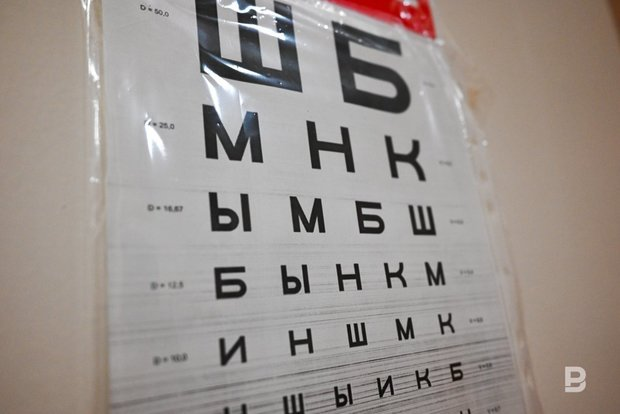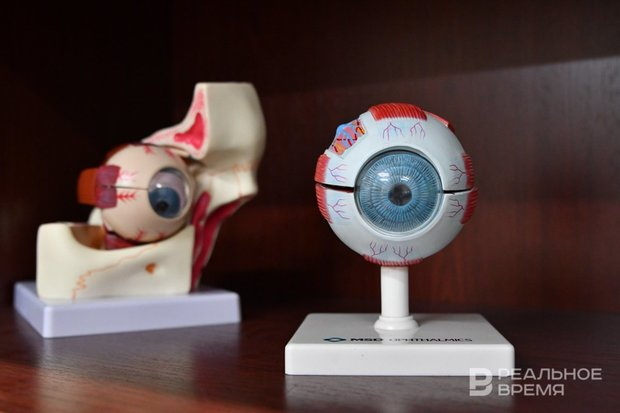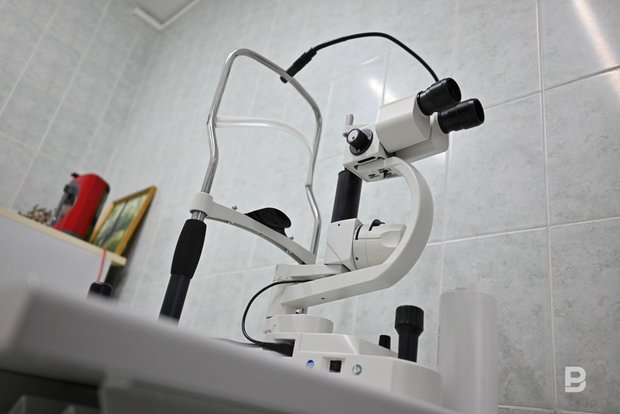Yelena Zhidenko: ‘The eye is brain on the periphery’
How to keep your vision healthy, if it can be restored, what serious diseases start asymptomatically and why eye doctors welcome the trend of 10,000 steps a day

Can vision improve even at an old age? Do supplements and vitamins help see better? Can vision get worse because of intense work? Is a vision check-up mandatory if a person sees well? International Ophthalmologist Day was celebrated on 8 August. Realnoe Vremya publishes an interview with vice chief physician of the Republican Clinical Ophthalmological Hospital Yelena Zhidenko. The doctor tells our readers about how to keep your vision healthy and what technologies ophthalmologists are familiar with today.
“A standard ophthalmological examination a year is crucial, correct and good!”
Mrs Zhidenko, I will start with a general question. How to keep your vision healthy for a long time and what to do if a person’s vision gets worse?
If you notice your vision is getting worse, you should see an ophthalmologist — a specialist who knows everything about eye issues: both diagnostics, therapy and surgery if needed — as soon as possible.
Some serious diseases are asymptomatic at early stages — a person’s vision is good but an eye pathology is developing. The pathology needs to be diagnosed on time to start the treatment on time. This is why to keep the eye health every person should visit an ophthalmologist at least once a year to even if people consider they are absolutely healthy and don’t have any complaints. This is necessary at any age.
What does an ophthalmologist’s preventive examination look like?
A standard ophthalmological examination includes a number of tests. First of all, it is measuring vision acuity, for instance, with the help of a chart everybody has been familiar with since childhood. If you wear glasses or lenses, such an examination will have to stages: for non-corrected vision and with the lenses (when prescribing glasses).
After that, intraocular pressure is measured to timely detect glaucoma if a patient starts to develop it because glaucoma is precisely one of those diseases that starts asymptomatically. This is why it cannot be felt at early stages — only a doctor can determine its start during examination.

If you wear glasses or lenses, such an examination will have to stages: for non-corrected vision and with the lenses (when prescribing glasses)
Then a doctor examines the fundus — the retina. You will be offered special eye drops that will make the pupil bigger and be thoroughly examined. If the doctor finds nothing suspicious as a result of the above-mentioned tests, he or she will see you only next year. But if some pathology is detected during the appointment (for instance, high ocular pressure or retina issues), the ophthalmologist will prescribe you more detailed examination using methods of diagnostics related to the issues detected. After that, a diagnosis is made and the doctor will determine the treatment. This can be a conservative therapy or, if needed, surgery. In a word, a standard ophthalmological examination a year is crucial, correct and good!

A kid’s organ of vision grows, optical relationships in the eyes change. The high load on the eyes must be considered too
Should kids’ vision also be examined every year?
Absolutely. A kid’s organ of vision grows, optical relationships in the eyes change. The high load on the eyes must be considered too, and the possible genetic predisposition to near-sightedness. This is why an examination should be done every year and professional intervention, correction of the kid’s vision formation are needed.
If vision issues don’t concern a person, can there be any other signals people can see a red flag and see an ophthalmologist after noticing them?
There can be. Look out for it, your relatives, for instance, kids. A person sometimes doesn’t have any complaints but constantly narrows the eyes when distinguishing something. Or as if corrects the eye position with the eye by pulling its external corner. Or always inclines the head at a certain angle when examining something. This can be near-sighted astigmatism: and then it seems to this person that he or she sees better with a specific focus, at a specific angle. You should notice such signals and be cautious: this is a reason to do an examination.

“Unfortunately, glaucoma is forever”
Is it possible that a person’s vision is worse but during examination turns out that that from an ophthalmological perspective everything is good and the problem is different?
Yes, this sometimes happens in neurological diseases. People who have blood circulation issues (for instance, a heart stroke in medical history) note a vision worsening. Of course, they address an ophthalmologist with such an issue. And during examination it turns out that here we can offer only correction methods, while the origin is different and the person should see a neurologist because vision worsening is the continuation of the neurological disease.
Everything is very close. The brain and the eyes aren’t just neighbours. They are closely related.
A surgeon from your hospital, Liliya Kamalova, once told us in an interview: “The eye is the continuation of the brain.”
Exactly. We, ophthalmologists say: “The eye is the brain on the periphery.” This is true. The vision organ is a brain tissue outside the brain case that performs a crucial and a highly differentiated function: light and colour distinction.
What are the most widely spread ophthalmological issues of Tatarstan residents?
People turn to us mainly with refraction and accommodation issues: it is far-sightedness, near-sightedness and astigmatism. Everything that requires contact or laser correction. The second most frequent disease is linked with the crystalline: cataracts of any origin (inherited, acquired, injure and age-related).
Glaucoma is on sad third position. It is a disease that starts asymptomatically and, sadly, takes the vision away forever. To keep the vision healthy, glaucoma needs to be detected at early stages, as I have already said, an ophthalmological examination should be regularly done. But mostly patients with glaucoma come to us when problems already started and some vision is lost forever. This disease cannot be treated, only its development can be stopped and vision can be fixed at a certain level. But the pathological process cannot be “turned off” completely — this chronic disease will accompany the patient throughout his or her life. Unfortunately, glaucoma is forever.

We have a good far-sight vision, don’t wear glasses when driving a car but we need them to work with objects that are located near. This is not a pathology, this is just age-related physiology
What eye diseases develop with age and what diseases are frequent for the youth too?
Near-sightedness, far-sightedness and astigmatism are often among the youth. However, age-related far-sightedness is not a myth either. Almost everybody who turned 40 years experience it. We easily change the focus: we look near and at a distance, accommodation is effortless. We don’t even notice how we do it. But our crystalline ages with us. Its physical features change, it becomes less dense and its elasticity, which is responsible for accommodation, goes down.
It means we have worse vision near and we have to put on glasses to see well. We have a good far-sight vision, don’t wear glasses when driving a car but we need them to work with objects that are located near. This is not a pathology, this is just age-related physiology.

How many surgeries are done at your hospital every day?
We do a record-high number of surgeries — around 150-200 a day. Some 30 surgeons work at our clinic. Approximately 12 people work in operating theatres at the same time. We got used to working at a high pace because the demand is high. If we work slower, we will have long queues, and this will be not only a huge burden on our clinic but also cause discomfort for our patients.
“We, ophthalmologists, strongly advocate today’s trend for 10,000 steps every day”
Is it true that you will see better if you eat a lot of carrot or blueberry? Do numerous supplements and plant-based drugs, vitamins that claim to specifically improve vision work?
Different components in these supplements, indeed, contain substances that are useful for the eye retina. I am talking about lutein, microelements and vitamins now. And they have a positive impact to a certain degree. They are really useful. But I cannot say they will cure an eye pathology. Cataract won’t disappear itself if surgery is not done. This is just additional support, and they provide certain benefits. They don’t do harm, but one should not pin excessive hopes on them. If a disease already exists, such drugs won’t have a curative effect.
Can reading or using a computer worsen the vision?
Uncontrolled load on the eyes is bad, like any excessive load. Of course, not all people become far-sighted. We all studied in the same way, but not 100% of the population wear glasses since childhood, but mainly those who had a predisposition. As I already said, a genetic predisposition to far-sightedness is the main origin. However, the risk of acquiring it with an excessive load goes up.
A modern-day life is that many of them work with a computer, don’t put the smart phone away and even have a rest looking at the phone screen after that all day long. How to keep the eye health? Perhaps, special glasses for computer that are used at an optician’s should be used?
An excessive load on the eyes cannot be eliminated by any glasses. The famous rules should be followed: one should work with the computer for 45 minutes and have a break for 15 minutes. Get up, go for a walk, look into the window (change the focus from near to distance). In our work, we try to alternate paperwork, work with a microscope and computer with other professional activities: go to the reception for one reason or another, talk with patients (because we should talk with them in detail), do some work that is not related into closely looking at letters, digits or the ocular. Types of activities should change throughout the day.
When we have a break, the mobile phone should rather be put aside. By the way, we, ophthalmologists, strongly advocate today’s trend for 10,000 steps every day because a person doesn’t look at the monitor or phone screen. The eyes have a rest, not to mention that movement is life. We urge people: if you have a free time, don’t rush to spend it checking social media or watching other content. Better go for a walk with your family, go to a public square, listen to music, swim in a swimming pool. This will be good not only for your physical state but also for your eyes.

By the way, we, ophthalmologists, strongly advocate today’s trend for 10,000 steps every day because a person doesn’t look at the monitor or phone screen
“The dry eye syndrome is the plague of modern time”
When a person experiences eye dryness as if there is sand in them, what is it?
The dry eye syndrome is the plague of modern time. Those who come to us with cataract, glaucoma, far-sightedness often turn to us with the dry eye syndrome too. This can be related to different reasons. For instance, the medical history: sty, conjunctivitis…There are everyday causes too: air conditioning in summer, heating appliances in winter — they all dry the air up and the eye surface at the same time. A previous eye surgery can also be cause for developing the dry eye syndrome. Users of contact lenses also often suffer from this syndrome because the integrity of the tear film is disrupted. There are many aspects, many reasons and today there are more people with the dry eye syndrome than 20 years ago.
What to do with it? Can this condition be treated?
When patients with such a condition turn to us, we prescribe special medicines — the so called humectants or tear substitutes. A person uses them, and this allow us to take the syndrome under control.
“We started to help more people”
Have the specifics of work at your hospital changed in the last 25 years?
As a surgeon I can say that the quality of patients changes. Earlier, we wouldn’t treat patients with age-related macular degeneration, with a vitreoretinal pathology — everything related to the retina was very problematic. And now we can treat such people, and this is why they are in our hospital.
Does ophthalmology have the concept of a high season?
More people turn to us in summer: perhaps, this has to do with holidays, the construction season. However, we always have a big workload at Admissions and Emergency. The thing is that the character of addresses is a bit different. For instance, in winter, it is champagne corks and fireworks, in summer, it is debris, in autumn, it is conjunctivitis, sties.
Let’s dream, what technologies, what breakthrough await us in ophthalmology in the near future?
Perhaps, it is already hard to dream with modern capabilities. But I would like to finally learn how to combat glaucoma. As a specialist I understand that it is impossible to restore the lost vision in glaucoma. But I would like to have some possibility of helping such patients, some alternative because irretrievable vision loss is a tragedy. And if there appears a technology to help such patients, as a doctor I will be very happy! While we haven’t yet learn how to do this, once again, I urge everybody to do ophthalmological check-ups on a regular basis and add this to their must plan.